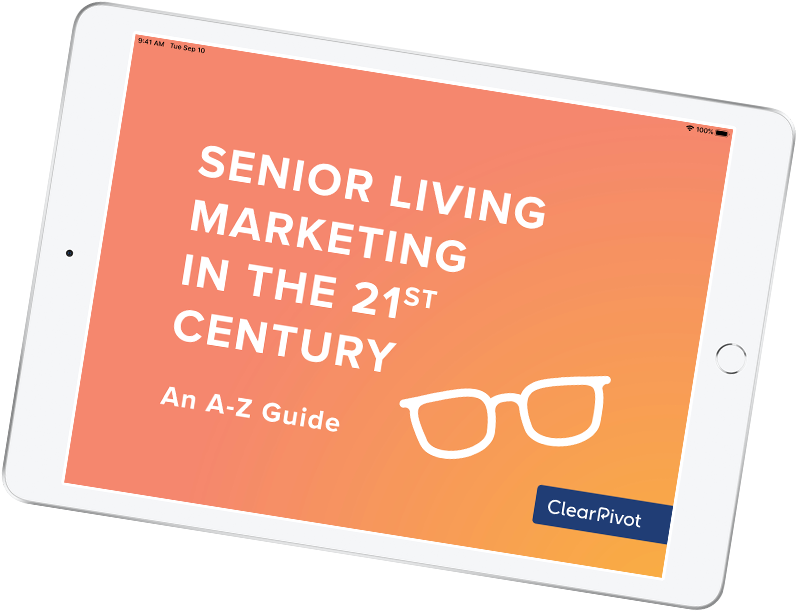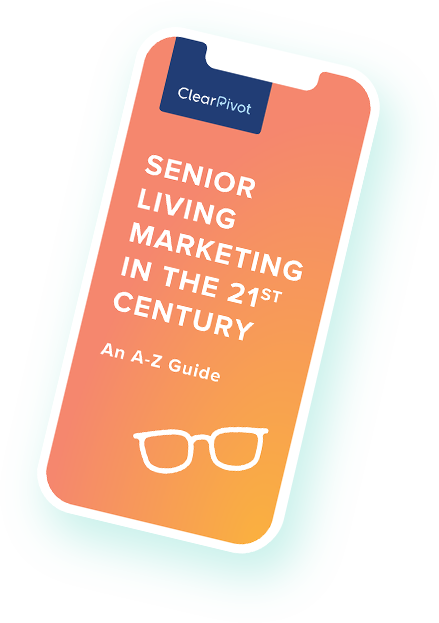Your Senior living Community's Most Important Marketing Asset
Because digital media is so foundational to modern marketing, it only makes sense to ensure that your community’s website is optimized so that your prospects will find all of the great information on it that you’re going to provide.
What’s more, because your website is one of the very first impressions almost of all your prospects will have of your community, you need to give them as great an experience on the site as you work to give them in person.
You therefore want to be sure your website:
- Downloads quickly. Not only do visitors leave slow sites, Google increasingly is looking at your site’s download speed when it comes to a search engine’s results.
- Has top-notch visual design. Visitors to your site immediately begin forming an opinion of your community’s quality, legitimacy, reliability, and trustworthiness. A high-quality user experience on your site, is an enormous factor in shaping their opinion of you.
- Has a solid, well-coded back-end. While invisible to your site users, and maybe even to you, the quality of the website’s content management system, and the quality of the custom theme code written on top of it, is massively important to your website’s long-term longevity. A great back-end is the difference between a site that can be maintained and expanded for years to come, and a site that needs to be completely rebuilt in a year or two.
- Makes it easy for your visitors to find what they are looking for quickly. Your site’s navigation should be simple, internally consistent, and intuitive.
- Looks great on all types of devices, not just a laptop or desktop computer. Make sure your site is optimized for people using the internet via a smartphone or tablet.
Content is Emperor
Time was – just five years or so ago – that search engines showcased those sites that had keyword-rich content. But search engine algorithms have definitely changed and now they primarily want content that’s useful for searchers. In other words, while Google, will still look at keyword density and word count, what’s most important to the search engine crawlers is good, solid information.
Your primary step, therefore, is to regularly publish articles (this includes blogs), videos, podcasts, and info-graphics. Make sure they are well produced and written/shot for people – make them readable – not for the search engine. Keywords should be used but search engines tend to focus on trying to understand the searcher’s intention. So make sure your content is logical and provides quality information
In fact, when it comes to written content, Google and other search engines want longer – much, much longer – content. Most article content has been 500 words or so in length, but Google loves long-form now, as in 1,500 to 2,000 words. It may not be possible to have web pages with that much content, but blog posts should be – at an absolute minimum – 1,200 words. A 2,000-word post is better because 2,000 words allow you to dive deeply into a topic. Google loves that.
Don’t be shy about adding internal links. Internal links within your content help people navigate easily around your site and also can help Google crawl your site all the more. An internal link is a link from one page to another of your website. Internal links can link to and from your blog posts, website pages, videos, downloads, etc. – anything that’s on a page on your site.
From Google Itself
If in doubt about what constitutes great content, Google has some advice. In a nutshell, Google says to ask these questions when it comes to your content:
- If you were a site visitor, would you trust the information presented?
- Is it written by an expert or someone who knows the topic really well?
- Does the content have factual errors, or even spelling or grammatical errors?
- Is the content offering original information, reporting or analysis?
- Does the content provide “substantial value” as compared to other pages that appeared in the search results?
If you remember nothing else from this section on optimizing your website, remember this:
Tailor your content to your prospects’ interests. Give them what they want: information. Every page, every piece of content on your site should address their questions and concerns while showcasing your expertise – your authority – on the subject.
 Yes, you probably have a website. It may even be a great one. But being online means more than just a website: you need to actively market your senior community online.
Yes, you probably have a website. It may even be a great one. But being online means more than just a website: you need to actively market your senior community online. To find the answers to the above, talk to your current residents, former residents (if applicable), the children of and former residents, your current prospects, etc. Talk to your salespeople: what trends are they seeing in the people who move into your community? Ask your sales staff about the ones who came close but didn’t move in: is there a pattern as to why they chose not to? Did they go to another facility? Why?
To find the answers to the above, talk to your current residents, former residents (if applicable), the children of and former residents, your current prospects, etc. Talk to your salespeople: what trends are they seeing in the people who move into your community? Ask your sales staff about the ones who came close but didn’t move in: is there a pattern as to why they chose not to? Did they go to another facility? Why? When it comes to seeing results from marketing your senior living community digitally, be prepared to be pleasantly shocked by the results! Digital inbound marketing brings prospects to you because you provide them the information they seek, give it to them when they ask for it (giving you their email address) and provides it to them where they hang out (social media and their inbox).
When it comes to seeing results from marketing your senior living community digitally, be prepared to be pleasantly shocked by the results! Digital inbound marketing brings prospects to you because you provide them the information they seek, give it to them when they ask for it (giving you their email address) and provides it to them where they hang out (social media and their inbox).
